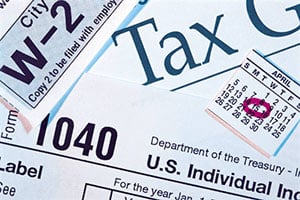Update: If you use TurboTax, and you’re still working on your taxes for tax year 2013, you should probably change your password. This article discusses a serious vulnerability in the web server software in use by some organizations. Take precautions to protect your information and identity.
Tax Preparation Software
According to an opinion piece published in the Wall Street Journal, “…more than three-fourths of all individual tax returns will be filed electronically [this year].” For those taxpayers who use their own computers and tax preparation applications, “Taxpayers who employ an accountant or other preparer have some protection from daunting penalties if the IRS finds mistakes. Software users who prepare their returns without help have little or no protection.”
Some pretty famous people have had problems, or claimed to have problems, with tax preparation software. According to the story, “During the confirmation hearings of Treasury Secretary Timothy Geithner three years ago, we learned that he failed to pay self-employment tax on income from the International Monetary Fund. Mr. Geithner partially blamed the oversight on the TurboTax software he had used…”
Today, the IRS and the tax court have not sided with taxpayers who claim “the TurboTax defense” like Secretary Geithner. In fact, the article states that, “So far the U.S. Tax Court has nearly always rejected the TurboTax defense. Only two cases have offered taxpayers penalty relief for software reliance.”
Ideas for Action
- The primary responsibility for accurately preparing a return with tax preparation software still resides squarely on you, the taxpayer. Careful review of your return manually remains important, especially if your tax situation is complex.
How to Fix a Botched Return
Jonnelle Marte’s column on the MarketWatch site picks up the thread, and offers a good backgrounder on when and how to fix mistakes in a previously filed income tax return. According to the article, “Tax pros say you should come clean about mistakes on your tax return as soon as possible, but exactly how you do so depends on the mistake. In fact, not all errors require filing an amended return, the Internal Revenue Service says.”
Ideas for Action
- Don’t file another original return on IRS form 1040. Use IRS form 1040X, even if you’re amending your return for tax year 2011.
- You have up to three years to refile a return that will produce a refund. The article explains the conditions that apply, and when the three year deadline ends for each tax year.
- Tax due situations are nothing to mess around with. If you owe a substantial amount, engaging a tax professional is a very good idea. According to the article, if the IRS discovers the error, “the government will bill you for: (1) the unpaid tax amount plus interest (currently at a 3% annual rate), (2) the additional failure-to-pay interest charge penalty (at a 6% annual rate), and (3) maybe other penalties too. But the IRS can waive penalties if you show you had a reasonable cause for the underpayment.”
- The article concludes by advising us to “be sure to use the current version of Form 1040X http://www.irs.gov/pub/irs-pdf/f1040x.pdf, which you can print out from the IRS website at http://www.irs.gov/. (Right now, the current version is dated December 2011.) If you need to attach corrected or additional tax forms, be sure to use the forms for the year you’re amending. For example, if you’re filing Form 1040X to claim additional itemized deductions for 2010, you’ll need to attach a corrected 2010 version of Schedule A. The IRS website has prior-year tax forms too (click on Forms and Publications; then click on Previous Years http://www.irs.gov/app/picklist/list/priorFormPublication.html).”
Budgeting
There are plenty of books, articles, software, and other media that explain how to establish a budget. Perhaps the hardest part is to commit to the plan you establish, regardless of how to implement it. At least the cost to establish a budget has gone down dramatically.
Intuit, the company behind Quicken and TurboTax, has a free online budgeting tool for families and individuals called Mint https://www.mint.com/. Intuit claims to have 7 million Mint users. The product is pretty simple to use, and may be all that you need to help you see where your money is going, and help you perform some rudimentary tax planning to avoid surprises in tax years to come.
Columnists like Dave Ramsey, Suze Orman, and other “celebrity financial experts” all have good plans, and will sell you tools, books, and programs to manage them in some cases. Whatever approach you take, it is never too late, and never too early, to make a financial plan and follow through on it.
Ideas for Action:
- Always file your tax returns on time–even if you can’t pay. You can get an automatic six month extension to enable you to complete your tax return filing for the year. Here’s an article on the IRS web site with more details on the procedure.
- The IRS has a “Fresh Start” initiative to help struggling taxpayers. Here’s an article that describes the program.
- Tax problems can be complex. I may be able to help you understand your situation; I can certainly help you by discussing certain trade-offs and options concerning your situation with the IRS and bankruptcy.
If You’re Due a Federal Tax Refund
Congratulations! Your refund as a consequence for paying too much in tax withholding will hopefully arrive soon. What should you do with this windfall? I wrote an article for tax year 2012 that offers seven alternatives for allocating your refund that I recommend to you.
IRS Debt and Bankruptcy
Generally speaking, taxes are exempt from discharge through bankruptcy. However, in some cases, you can discharge an IRS debt using a Chapter 7 bankruptcy filing. The only IRS debts that can be discharged are those that are over three years old. There are certain conditions that must be met first. Read more about IRS and bankruptcy in an earlier article I posted on my site.
If All This Seems Confusing or Too Complicated, Please Call Us for Help
Tax problems can be complex. I may be able to help you understand your situation; I can certainly help you by discussing certain trade-offs and options concerning your situation with the IRS and bankruptcy. Contact my office for a free, no obligation consultation right away!




